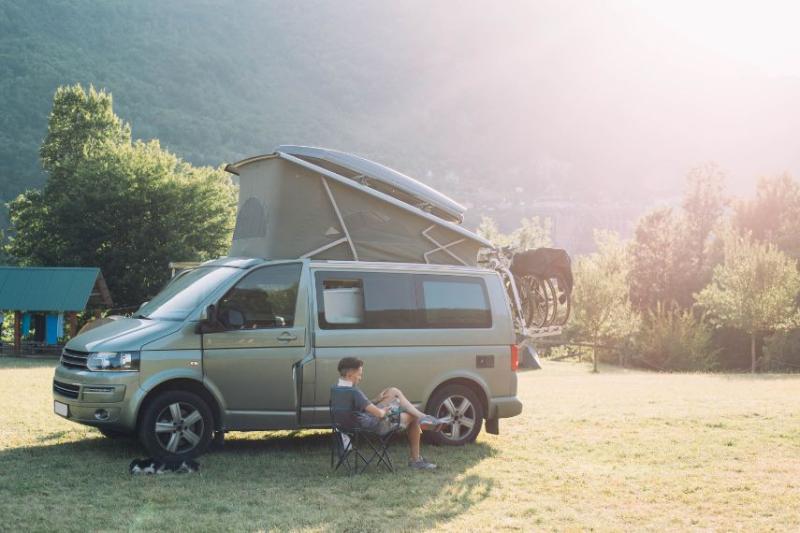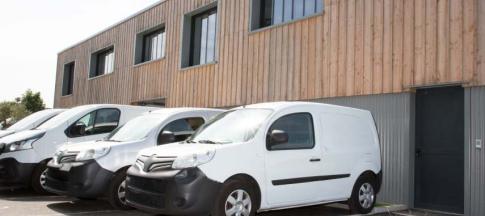
Our guide looks at where to buy a campervan, what checks to make, which campervan essentials to fill it with and the extra costs to consider, like campervan insurance.
Which campervan should I buy?
Answer these questions to narrow your search and find the right campervan.
How do you plan on using your campervan?
You can use your campervan for:
- family day trips, which could involve carting around a lot of cargo like deck chairs or surf boards
- weekend trips away, maybe just you and a friend or partner
- extended trips, which might include taking it abroad
Pick a campervan that suits your needs. If you’re using it for extended trips, you’ll want amenities like a sink, hob and some extra space to live in.
But if you’re going to use it for day or weekend trips, you might prioritise storage and be fine with a camping stove and washing-up bucket instead.
What size campervan do you need?
If you can’t decide what type of campervan you want, use size as a guide.
- A mini campervan is ideal for a couple or two adults. It’s more affordable, easy to drive and park, but will have reduced storage as it’s smaller.
- A small campervan is also a good size for two adults, but will be a more comfortable fit, with a kitchen area and toilet.
- A medium-sized campervan sleeps up to four people and will have bathroom space, kitchen space and decent storage.
- A large or extra-large model will have plenty of sleeping, kitchen and toilet space. It’ll also have lots of extra seating, storage and space to move around too. These can fit roughly four to six people.
Remember: not everyone may want to sleep in the same space. You might want to buy a tent so some people can sleep separately.
What’s your budget?
Budget doesn’t just mean upfront costs, it also includes:
- insurance
- servicing, repairs and parts
- equipment
- interest payments
- refuelling
- storage and parking
- extra equipment
Decide whether you’re going to budget for a new or used campervan.
Investing in a new campervan will hold its value for longer, so if you’re forced to sell you won’t be left out of pocket.
You could also rent a camper to begin with. This can help you decide if van life is for you and could also give you more time to save for a campervan.
The best way to buy a campervan
Most people buy a campervan either via a dealer, privately from classified ads, or from friends and families. Each has its pros and cons.
Buying a campervan from a dealer
Pros
- warranty – most new and used vehicles come with a warranty backed by the manufacturer, giving you peace of mind if anything goes wrong
- added consumer protection - the Consumer Credit Act will protect you if you pay for part or all of the van by credit card
- MOT and vehicle history vetting – a dealer will likely vet the vehicle’s history, including mileage, service record and registration, and almost all approved used vans are sold with a new MOT too
Cons
- cost – things like warranties, extra services, and dealer commission can bump up the price
When you choose a dealer, check the company out before you buy.
Read customer reviews, and check if they’re accredited by motoring organisations, like the Society of Motor Manufacturers and Traders (SMMT) or British Independent Motor Traders Association (BIMTA).
Reliable dealers will let you test drive the vehicle too, which we recommend before buying.
Buying a campervan privately
Pros
- lower prices – you’re likely to get a better price than you will through a dealer
- less pressure - some people don’t enjoy buying from a salesperson
Cons
- need to be wary of scams – if a deal is too good to be true, it probably is
- less consumer protection if something goes wrong
Try to compare several similar vehicles to get an idea of the price range you can expect. Look at the van’s age, model and condition.
If you’re meeting a private seller, take someone with you, especially if you’re carrying a lot of cash. Examine all documents, including things like its service history and MOT certificate.
Buying a campervan from friends and family
It can be tempting to buy from a friend or family member, but the same rules apply as buying from any other private seller.
Pros
- price – it’s generally easier to get a better price from family.
- knowledge – you may already know the vehicle or have driven it before.
- personal relationship with the seller – you know the seller, so it’s easier to trust or contact them if things go wrong.
Cons
- impact on relationships – sometimes, involving friends or family in finances can lead to a soured relationship
Important checks to make before you buy a campervan
Wherever you’re buying from, you need to do a few checks before you finalise the sale.
Take it for a test drive
We recommend test driving. It gives you a good idea of what the vehicle’s like, and it allows you to spot any issues.
Try to get a feel for the steering and braking. Listen to the engine and any noise from the suspension – knocking and rattling aren’t good.
Check the headlights, wipers and dashboard warning lights. See if all the windows and locks work too. If there’s a stereo system, make sure it works and is included with the van.
Learn how to test drive a car effectively.
Check the service history
Ask to see a service record. Ideally, you’d like to see regular servicing.
An underserviced campervan might not necessarily be in bad condition, but you’d expect to pay less for it.
Read our guide on the importance of servicing.
Pop the roof
If the van has a roof, raise it a couple of times, watching from both inside and outside.
One of the most important things to check is that the pop-up roof locks securely; you don’t want it popping open on the road.
Check the safety equipment
Many campervans have basic safety equipment, like a fire extinguisher and fire blanket. Check these and the seatbelts too, looking for any fraying or other damage.
Ensure the electrics are working
If your campervan has bad wiring it could lead to a fire. Have the electrical system checked by an electrician before you buy if you’re not confident doing it yourself – especially if the campervan has features like televisions, fridges, or electric cookers.
Check the bodywork and tyres
Look for any dents or scratches, as well as rust. Older campervans tend to suffer from rust, and you’ll usually find it under the bottom of doors, the headlights, wheel arches and carpets.
Rust isn’t necessarily a big problem but it’s good to be aware of. It’ll also help you get a fair price for the condition of the van.
Check the tyres as well and look for uneven wear which could be caused by incorrect alignment or suspension issues.
Get a professional inspection
Get the campervan professionally looked over if you’re not confident making any of the checks yourself, or if you’d like a reliable opinion.
Campervan essentials
Choosing the vehicle is just the start. To help you make the most of your time on the road, here’s a list of essential campervan accessories:
- campervan awning
- portable lighting
- cooking essentials – like a kettle, travel stove, saucepans, and portable barbeque
- windscreen and window blinds – for solar protection, insulation or privacy
- a clothesline
- UK sticker if you’re driving in Europe
- campervan safe, alarm and/or immobiliser
- portable campervan shower
- storage boxes
- groundsheet, tent and tent pegs – for any extra campers
- a hammock – can be attached to the van exterior
- gadgets and tech – like a Wi-Fi booster or pocket Wi-Fi, Bluetooth speaker, torch
What driving licence do I need?
If you got your driving licence before the 1st of January 1997, you can drive any vehicle up to 7,500kg or 8,250kg including a trailer.
If you got your licence after this date, or are over the age of 70, you have a limit of up to 3,500kg. This means you’d need to take an extra driving test to add the C1 category to your licence if your new van exceeds this weight.
Head to the government website to find out how to get the right licence to drive your new campervan.
Campervan insurance
Consider what insurance you need when buying a new campervan. Find out about our different types and levels of cover on our campervan insurance page, and head here to get a quote.
Can I drive a campervan on my car insurance?
We identify a vehicle based on its registration number, which helps us determine if your camper is a car or a van.
You can’t drive it on your car insurance if we classify it as a van and not a car – however, you can insure cars and vans on one MultiCar policy.


